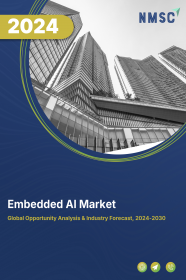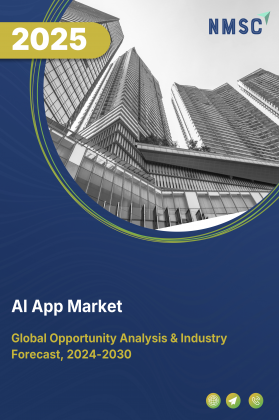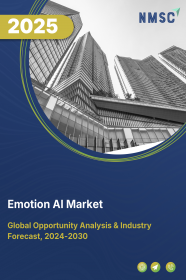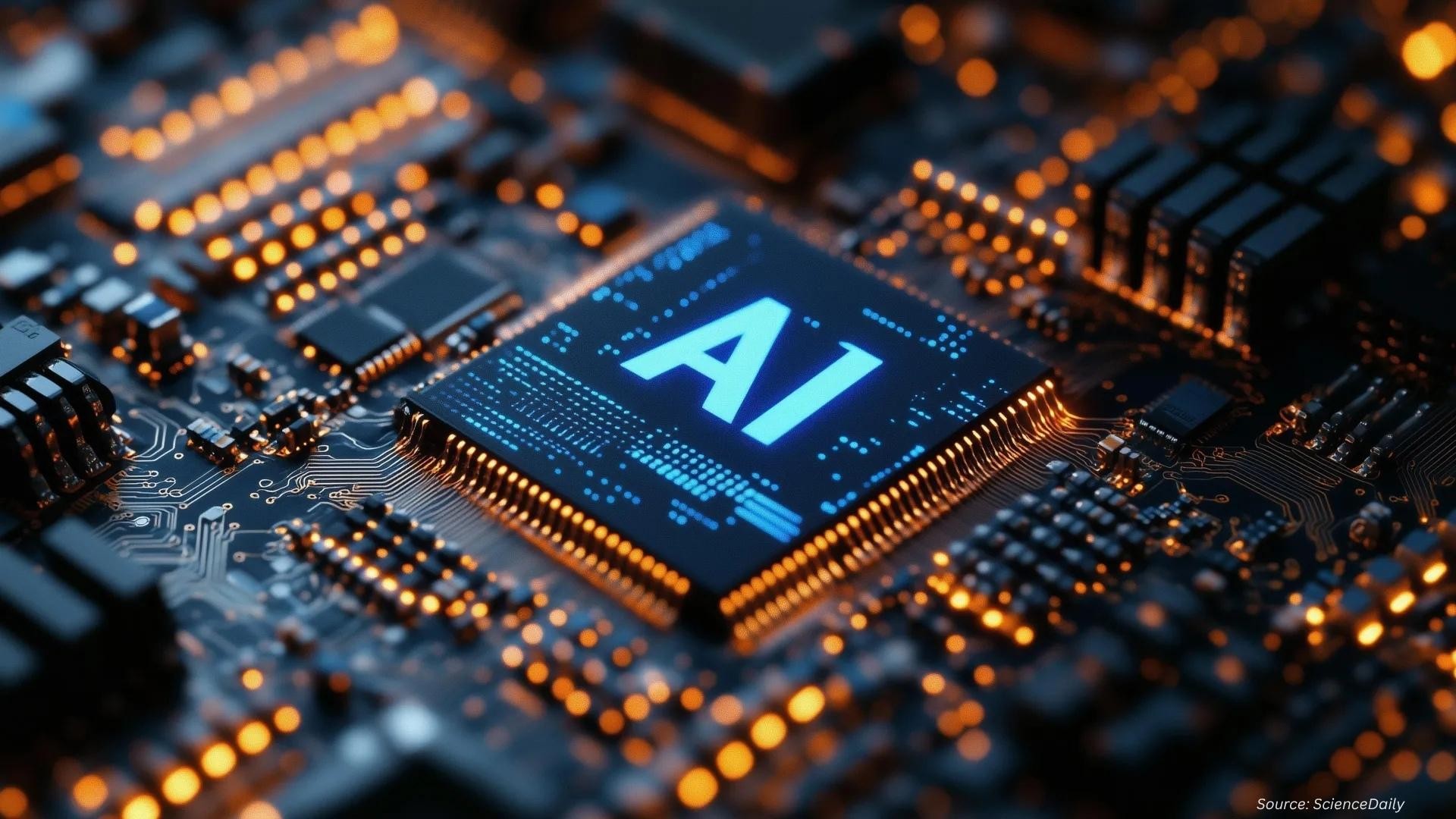
Embedded AI Market by Component (Hardware, Software, and Services), by Deployment (On-premise and Cloud), by Application (Smart Phone, Wearable Device, Vehicle Electronics, Smart Home, Security Monitoring, Robot, and Others), and by End-user (Automotive, Healthcare, Consumer Electronics, and Others) - Global Opportunity Analysis and Industry Forecast 2024-2030
Embedded AI Market Overview
The Embedded AI Market size was valued at USD 11.47 billion in 2023 and is predicted to reach USD 30.60 billion by 2030 with a CAGR of 15.1% from 2024-2030. Embedded Artificial Intelligence market refers to the global industry focused on integrating artificial intelligence capabilities specifically into hardware and software systems within devices. Embedded AI encompasses solutions where AI algorithms are embedded into various devices and applications to enable real-time data processing, decision making, and automation without relying on external cloud services. Organizations use embedded AI to enhance the performance, efficiency, and functionality of their products such as autonomous vehicle, smart sensors, consumer electronics, and industrial machineries. This industry includes AI chipsets, development platforms, and embedded software’s specifically designed for industries such as healthcare, automotive, manufacturing and others driving innovative solutions through intelligent self-sufficient systems.
Market Dynamics and Trends
The surge in the adoption of smart devices such as smartphones, wearables, and home automation systems are significantly boosting the market growth. According to a GSMA report as of 2023, around 4.3 billion of the global population owns a smartphone. Also, around 49% of world’s population have access to mobile internet using a smartphone and feature phones.
Embedded AI enhances these devices by providing high-tech features, that includes voice recognition, intelligent automation, and personalized recommendations, improving overall user experience and functionality. Thus, the rising number of smart devices is creating significant demand for more interactive and responsive technologies including embedded AI technology.
Moreover, the rising investments in research and development by technology companies and startups are also driving the embedded AI market growth. As per the latest report published by the Goldman Sachs, investment in AI is expected to reach USD 200 billion globally by 2025.These investments are aimed at developing advanced AI technologies such as computer vision, machine learning, and natural language processing, which are used in embedded AI systems.
Furthermore, the growing number of smart cities projects worldwide is also driving the adoption of embedded AI systems, which are used in various applications such as traffic management and public safety. The use of embedded AI systems in smart cities can improve the efficiency and effectiveness of city services and make them more responsive to the needs of citizens.
However, AI systems collects and process large amounts of sensitive data, that raises concerns about data privacy and security, thus restraining the embedded AI market demand. On the other hand, the introduction of neuromorphic computing is expected to create ample growth opportunities for the market in the future. It is a type of computing that mimics the structure and function of the human brain. This type of computing is highly efficient and can handle a wide range of tasks, making it well-suited for embedded AI applications.
Market Segmentation and Scope of Study
The global embedded AI market report is segmented on the basis of component, deployment, application, end-user, and geography. Based on type, the market is classified into hardware, software, and services. Based on the deployment, the market is segmented into on-premise and cloud. On the basis of application, the market is categorized into smart phone, wearable device, vehicle electronics, smart home, security monitoring, robot, and others. On the basis of end users, the market is divided into automotive, healthcare, consumer electronics, and others. Geographical breakdown and analysis of each of the aforesaid classifications include regions comprising of North America, Europe, Asia-Pacific, and RoW.
Geographical Analysis
North America dominates the global embedded AI market share and is potently expected to remain dominant in the market throughout the forecast period. This is attributed to the rising demand along with the research and development in autonomous vehicles in the region.
According to a report published by the National News in December 2022, tech giant Apple is working on a project named ‘Project Titan’ with an aim to develop a fully autonomous electric vehicle, which is expected to launch by the year 2026.
Autonomous vehicles require advanced technologies such as computer vision, machine learning, and natural language processing to navigate and make decisions without human input. These technologies are powered by embedded AI systems, which are small and efficient enough to be used in vehicles.
Moreover, the presence of major market players such as Qualcomm Inc. and Google LLC that are adopting various strategies including product launches are further accelerating the growth of the market. For instance, in November 2022, Qualcomm launched the latest Snapdragon processor for the next generation top-tier android smartphones.
With artificial intelligence infused throughout the chip to boost photography, sound, connectivity, gaming and security and it is four times faster than its previous chips. Also, in October 2022, Google launched a secure open-source operating system ‘KataOS’, for embedded systems using machine learning with the Rust language. The operating system is based on the secure seL4 microkernel from the Linux Foundation that is mathematically proven secure, with guaranteed confidentiality, integrity, and availability.
On the other hand, Asia Pacific shows substantial growth in the global market owing to rising semiconductor market in countries such as Taiwan, South Korea, and Japan. According to the Taiwan Semiconductor Industry Association, the country represents approximately 62.9% of global integrated circuit (IC) foundry revenue.
Taiwan semiconductor industry consisted of 250 IC fabless design houses, 13 fabrication companies, and 37 packaging and testing houses in 2021. This strong industry presence provides essential components, such as AI chips, that is require to develop and integrate advanced embedded AI systems, thus driving the market growth.
Moreover, the rising government initiatives in promoting AI research and development with policies and funding is further boosting the growth of the market. For instance, China’s AI development plan and Japan’s Society initiative to promote the integration of AI into multiple sectors, encouraging businesses to adopt and develop AI technologies. These supportive measures are accelerating the growth of the market in the region.
Competitive Landscape
Various key market players operating in the embedded AI industry include Microsoft Corporation, Qualcomm Inc., Intel Corporation, Google LLC, NVIDIA Corporation, NXP Semiconductors, STMicroelectronics, Renesas Electronics Corporation, SenseTime, and Horizon Robotics. These market players are adopting various strategies such as product launches and acquisition to maintain their dominance in the global market.
For instance, in November 2023, Microsoft launched custom AI server chips for Azure, aiming to enhance the performance and efficiency in AI workloads on its cloud platforms. This initiative directly targets the embedded AI industry by providing specialized hardware solutions that optimize AI processing capabilities in cloud environment.
Also, in November 2022, STMicroelectronics launched ‘LSM6DSV16X’, the flagship 6-axis inertial measurement unit (IMU) embedding ST’s Sensor Fusion Low Power (SFLP) technology, Artificial Intelligence (AI), and adaptive-self-configuration (ASC) for superior power optimization. The advanced architecture of the LSM6DSV16X allows complex processing in the edge, making the device ideal for advanced 3D phone mapping, context awareness in laptops and tablets.
Moreover, in July 2022, Renesas Electronics Corporation acquired Reality Analytics, Inc. (Reality AI). This acquisition will allow Renesas to expand its tool suite and software offerings for AI applications and increase its in-house capability to provide highly optimized endpoint solutions that combine both hardware and software.
Key Benefits
-
The report provides quantitative analysis and estimations of the embedded AI market from 2024 to 2030, which assists in identifying the prevailing industry opportunities.
-
The study comprises a deep-dive analysis of the current and future embedded AI market to depict prevalent investment pockets in the industry.
-
Information related to key drivers, restraints, and opportunities and their impact on the embedded AI market is provided in the report.
-
Competitive analysis of the key players, along with their market share is provided in the report.
-
SWOT analysis and Porters Five Forces model is elaborated on the study.
-
Value chain analysis in the market study provides a clear picture of roles of stakeholders.
Embedded AI Market Key Segments
By Component
-
Hardware
-
Software
-
Services
By Deployment
-
On-premise
-
Cloud
By Application
-
Smart Phone
-
Wearable Device
-
Vehicle Electronics
-
Smart Home
-
Security Monitoring
-
Robot
-
Others
By End-Users
-
Automotive
-
Healthcare
-
Consumer Electronics
-
Others
By Region
-
North America
-
U.S
-
Canada
-
Mexico
-
-
Europe
-
UK
-
Germany
-
France
-
Italy
-
Spain
-
Denmark
-
Netherlands
-
Finland
-
Sweden
-
Norway
-
Russia
-
Rest of Europe
-
-
Asia-Pacific
-
China
-
Japan
-
India
-
South Korea
-
Australia
-
Indonesia
-
Singapore
-
Taiwan
-
Thailand
-
Rest of Asia-Pacific
-
-
Rest of the World (RoW)
-
Latin America
-
Middle East
-
Africa
-
REPORT SCOPE AND SEGMENTATION:
|
Parameters |
Details |
|
Market Size in 2023 |
USD 11.47 Billion |
|
Revenue Forecast in 2030 |
USD 30.60 Billion |
|
Revenue Growth Rate |
CAGR of 15.1% from 2024 to 2030 |
|
Analysis Period |
2023–2030 |
|
Base Year Considered |
2023 |
|
Forecast Period |
2024–2030 |
|
Market Size Estimation |
Billion (USD) |
|
Growth Factors |
|
|
Countries Covered |
28 |
|
Companies Profiled |
10 |
|
Market Share |
Available for 10 companies |
|
Customization Scope |
Free customization (equivalent up to 80 working hours of analysts) after purchase. Addition or alteration to country, regional, and segment scope. |
|
Pricing and Purchase Options |
Avail customized purchase options to meet your exact research needs. |
KEY PLAYERS
-
Microsoft Corporation
-
Qualcomm Inc.
-
Intel Corporation
-
Google LLC
-
NVIDIA Corporation
-
NXP Semiconductors
-
STMicroelectronics
-
Renesas Electronics Corporation
-
SenseTime
-
Horizon Robotics




















 Speak to Our Analyst
Speak to Our Analyst

























